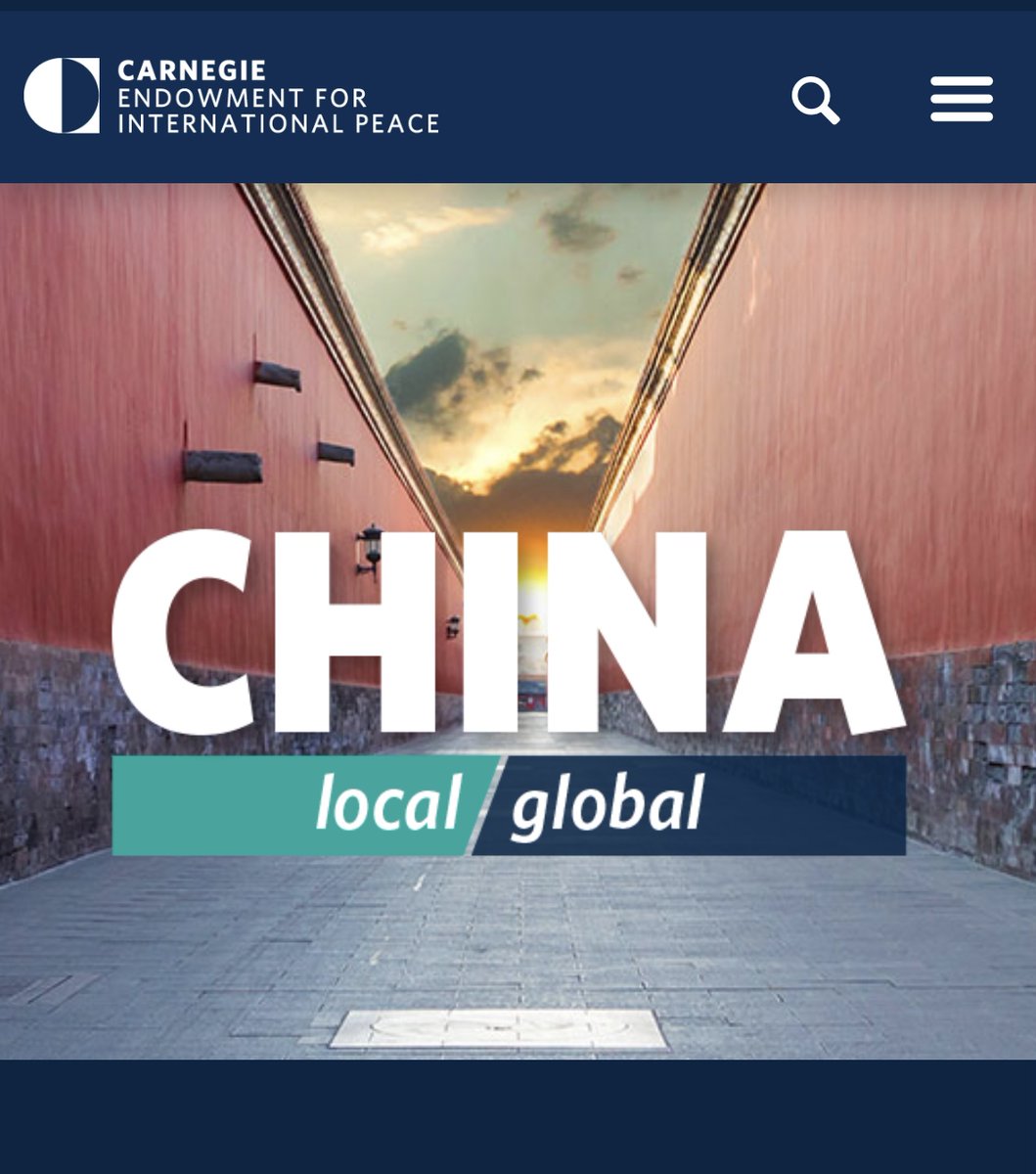
1: Here's a new paper in our seven region @CarnegieEndow #ChinaLocalGlobal initiative. Yuan Wang from @DukeKunshan and @Hangwei_Li ex @SOASpolitics explore how differing media norms in Kenya and Ethiopia yielded differing PR strategies by Chinese firms. carnegieendowment.org/2023/02/27/afr…
2: The paper focuses on the corporate communication strategies of three Chinese state firms involved in two flagship rail projects in Africa: the Standard Gauge Railway in Kenya, constructed by CRBC, and the Addis Ababa–Djibouti Railway in Ethiopia, constructed by CCECC and CREC.
3: Drawing on fieldwork they argue that these Chinese state firms exhibited divergent paths. CRBC has learned and adapted, largely because of Kenya's vibrant media environment and watchdog journalism; CCECC and CREC didn't because Ethiopia lacks naming and shaming by local media.
4: By looking at comparative adaptiveness in two places, they show that openness and pluralism do matter. African non-state actors, such as the media, can have a considerable influence in shaping certain behaviors of Chinese actors within the asymmetric China-Africa relationship.
5: They argue that Chinese firms need better local engagement but also that it is vital to strengthen the capacity of local journalists to improve quality and accuracy in reporting and ensure the triumph of watchdog journalism norms, not state-connected developmental journalism.
6: #ChinaLocalGlobal is a seven-region initiative at @CarnegieEndow supported by @FordFoundation. It explores how China extends its global influence not just by exporting a putative "China model" but by adapting to local forms, norms, and practices while leveraging local actors. 

7: Be sure to check out earlier papers in the project. For instance, @KassenovaNargis from @DCRES_Harvard takes a fascinating look at how how China’s foreign aid fosters social bonds with Central Asian ruling elites. carnegieendowment.org/2022/12/07/how…
8: In Turkey (and in an interesting comparative contrast to the new Kenya/Ethiopia paper), @CagdasUngor from @marmara1883 explores how Beijing and its proxies have adapted to the highly localized rules, styles, and norms of the Turkish mediasphere. carnegieendowment.org/2022/11/09/chi…
9: Celio Hiratuka, a Brazilian economist at @unicampoficial, explores how Brazil's localization requirements shaped the behavior of Chinese firms, such as BYD. carnegieendowment.org/2022/10/20/why…
10: In three West African countries, Abdoulkadre Ado digs into Chinese firms' assimilation of local managerial practices in three countries: Ghana, Niger, and Nigeria. carnegieendowment.org/2022/10/27/wha…
11: In Southeast Asia, @GPriyandita @dvanderkley and @B_Herscovitch dig deep into how China's telecom champions leveraged localization to become Indonesia's cybersecurity partners of choice. carnegieendowment.org/2022/07/11/loc…
12: Guanie Lim and Keng Khoon Ng explored how Chinese investors in Malaysian real estate are learning hard lessons about how to navigate local turf wars and the risks of Malaysian politics. carnegieendowment.org/2022/06/08/how…
13: Meanwhile, @folasoule from @BlavatnikSchool dives deep into how Beninese officials negotiated local norms and business practices with China to become a West African business hub. carnegieendowment.org/2022/04/06/neg…
14: In a fantastic, cross-regional, and comparative read to the aforementioned Indonesia paper, @TinhinanEl from @ChathamHouse likewise explores how China's telecoms champion Huawei adapted to Algerian and Egyptian demands for localization. carnegieendowment.org/2022/04/14/how…
15: In another deeply researched study, @gongxuegxgx from @RSIS_NTU traces the interactive dynamics between Chinese players and a wide array of local civic actors in Myanmar around the Letpadaung copper mine. carnegieendowment.org/2022/01/25/chi…
16: Back in Latin America, @julianagj explored how national, provincial, and corporate players in Argentina pushed Chinese investors to support the country's energy transition and help revitalize their grid. carnegieendowment.org/2021/12/22/how…
17: In another paper that complements both the new paper and Üngör's on Turkey, @RYellinek explored how Chinese players, to bolster their influence in Israel, have leveraged local Hebrew language media to calibrate their messages for Israeli audiences. carnegieendowment.org/2021/10/27/how…
18: In a pathbreaking and notably counter-consensus paper, @dvanderkley and @nivayau show how China's economic profile in Central Asia increasingly means investments in value-added industry, local hires, and upskilling. Locals are driving this shift. carnegieendowment.org/2021/10/15/how…
19: In Ecuador, @cquiliconi and Pablo Rodriguez Vasco explore how Chinese miners' efforts to leverage local players undercut and divided Indigenous opposition in unsustainable ways. Ultimately, this backfired on them. carnegieendowment.org/2021/09/20/chi…
20: In the Philippines, @alvincamba showed how Chinese players accommodated Philippine ruling elites concerned with political expediency in sidestepping social and environmental safeguards on infrastructure projects. carnegieendowment.org/2021/06/15/how…
21: In Pakistan, @KatAdeney and @FilippoBoni1 explored bilateral negotiating records to show how Pakistani actors have wielded agency in important ways, while Chinese actors at times have accommodated key Pakistani demands. carnegieendowment.org/2021/05/24/how…
22: Also in Brazil, @AAbdenur, @mafolly, and @msantoro1978 show how Chinese-funded railway projects in the Amazon were profoundly shaped by dynamic institutional learning on both sides and sharp public debates in Brazil about environmental sustainability. carnegieendowment.org/2021/08/04/wha…
23: In Pakistan again, Muhammad Tayyab Safdar shows how Chinese inroads have been built on the diversification of ties to *local* stakeholders, notably in the education, media, and energy sectors. carnegieendowment.org/2021/06/02/loc…
24: And in Chile, @FranciscoUrdin explored how medical and equipment supplies during the pandemic have come from a diverse cast of Chinese players with local experience in Chile. They adapted to Chile’s unique system of emergency and disaster management. carnegieendowment.org/2021/04/06/chi…
25: One of the most exciting things about this initiative is the ability to draw cross-regional comparative insights. So in January, for example, I moderated this conversation among authors from Latin America, Southeast Asia, South Asia and Central Asia. carnegieendowment.org/2022/01/27/how…
26: And we do this topically too. For instance, in October, I moderated a discussion between @TinhinanEl on Algeria and Egypt and @B_Herscovitch on Indonesia, where Chinese telecoms firms have adapted and localized - with mixed results for local economies. carnegieendowment.org/2022/10/06/loc…
27: And here's a conversation from March among different project authors from South Asia, Latin America, and Southeast Asia about how Chinese players adapt to local conditions outside national capitals. carnegieendowment.org/2022/03/10/chi…
28: But that's not all. A project that purports to be about the connections between what's "local" and what's "global" needs to reach *local* audiences. So we translate every paper into local languages and also do local language multimedia products, subtitled into English.
29: From Spanish to Burmese, Hebrew to Portuguese, Arabic to Russian, and French to Malay, you can read *every* paper in this project in both English and the language of the case country. Illustratively, here's a link to @TinhinanEl's paper in Arabic: carnegieendowment.org/files/El_Kadi_…
30: And we try to reach local audiences through local language video projects too, such as @julianagj's video in subtitled Spanish on Chinese investments in Argentina's renewables sector:
https://twitter.com/CarnegieEndow/status/1501276313834848258?s=20
31: And here's another example, featuring @GPriyandita discussing his co-authored paper in Indonesian:
https://twitter.com/CarnegieEndow/status/1572601779656728576?s=20
32: We're working across seven regions: Africa, Central Asia, Latin America, the Middle East and North Africa, the Pacific, South Asia, and Southeast Asia—exploring adaptive Chinese strategies that work within local realities. Papers and multimedia here: carnegieendowment.org/specialproject…
33: Stay tuned for more exciting papers, events and multimedia products in coming months on adaptive local and Chinese strategies and interactions in all seven regions, including case studies of places as far afield as Saudi Arabia, Indonesia, Peru, and Papua New Guinea. 

• • •
Missing some Tweet in this thread? You can try to
force a refresh






